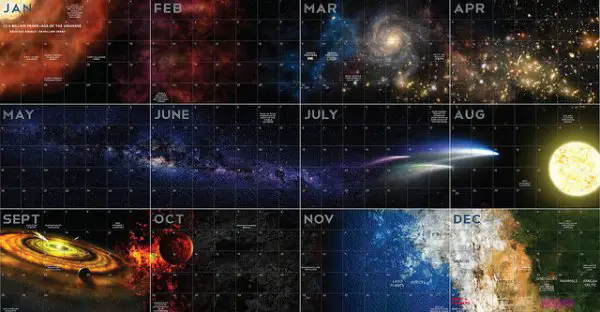The Secret Meaning Behind The Days Of The Week
Tags: opinion

The days of the week are something that are in constant use within our language and conversation. But what many do not know is there are secret hidden meanings and messages embedded within many of the word we use giving them a far more significant and symbolic meaning than that of just a simple sound.
Astrology is something that in deeply rooted within ancient cultures across the globe. The Mayans, The Ancient Egyptians, The Sumerians and many other ancient cultures worshipped the sky and believed the historic origins of humanity can be told by an understanding of the sky.
This may seem like a culture that we are currently far removed from, however you will see in just a moment that the language we use everyday celebrates these same ideas that the ancient traditions used to celebrate.
The days of the week are of Latin origin being named by the Romans with the words for the Sun, the Moon, and the five known planets of the time. These names have continued into most European languages, with English names we use having an Anglo-Saxon influence.
Many people think of Monday as the first day of the week however it is actually Sunday and dependent on how you interpret modern day culture there could be a very real reason why Monday is used to signify the start of a workweek in modern day society.
Sunday is Sun-day meaning the day of the Sun. There are many Sun gods cross culturally, the most famous perhaps are the 3 egyptian sun gods- Horus who is the rising sun, Ra the noon sun and Osiris who represents the setting sun. The sun signifies creation, protection, power and good health.
Monday is Moon-day meaning the day of the moon. The moon is closely related to reflection as the moon’s light comes from the reflection of the sun. This is of course the polar opposite of what Monday are used for in modern day western culture, being that Mondays usually represent chaos and returning to work after the weekend.
Tuesday is Tiws-Day, Tiw was a god of war, and was equivalent to the Roman Mars. His main characteristics were that of honor, justice and courage. So Tiw represents Mars, meaning Tuesday is Mars day.
Wednesday is Wodens-day the Anglo-Saxon equivalent of the Norse Odin or the Roman Mercury a sky god and the god of wisdom, poetry, commerce, travel, thievery, eloquence and science. He is also the messenger of the other gods. Woden represents Mercury, meaning that Wednesday is Mercury day.
Thursday is Thors-day Thor being the Norse god of thunder. He is represented riding a chariot which is drawn by goats, while wielding a hammer. He is the defender of the Aesir (a tribe of gods), destined to kill and be killed by the Midgard Serpent. Thor has been popularised by modern day Marvel comics, but is a real mythological character and while there are differences Thor is similar to Zeus who is the Greek god of thunder. He is the equivalent to the Roman Jupiter. Meaning Thursday is Jupiter day.
Friday is Frigg-day Frigg is the Norse god of love and fertility. In most sources she is described as wife to Odin (who represents Mercury- Wednesday). Sources also connect her with the goddess Fulla She is the equivalent of the Roman Venus, meaning that Friday is Venus day.
Saturday is Saturn-day with Saturn being the Roman god of agriculture. Also known as Cronus who is son of Uranus and Gaea. He lead the Titans (his brothers and sisters), to revolt against their father to become king of the gods. Saturn is concerned with the sowing of seeds, so a day for manifestation. Saturn’s wife was Ops who was the goddess of plenty. So Saturday is Saturn day.
The significance given to astrology and the universe is all there, hidden within our language. It makes you wonder how many more messages are encoded within the words we use on a daily basis and the effect it has on our day to day lives. Please share this article with your loved ones! Much love, Luke
Leave Comment: